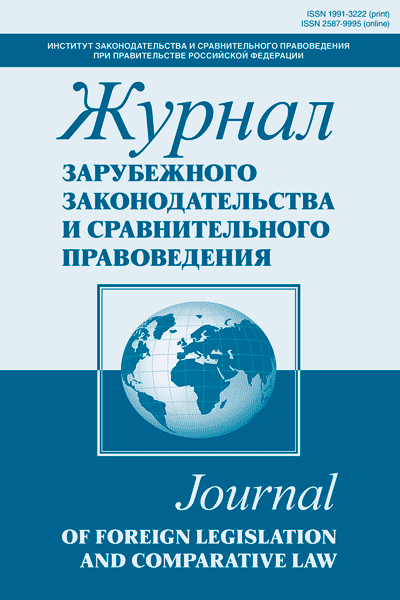The article describes the role and importance of comparative legal research methodology on the example of the institute of the right to a healthy environment and ways to protect it in the Russian Federation and India. The works of leading legal scholars who have made a significant contribution to the development of modern comparative law are analyzes. The provisions of the Constitution of the Russian Federation and India, enshrining the right to a healthy environment are studied by the authors. The status of the public authorities involved in the process of protection of the right to a healthy environment in Russia and India is analyzed. The special role of the judiciary in the legislative branch of government, as well as the value of judgments in the environmental legislation of India is emphasized. Common and distinctive features of legal principles aimed at protecting the environment in the Russian Federation and India are allocated. The authors conclude that, with respect to the object of study, the use of comparative legal methodology makes it possible to identify the characteristics and the basic directions of the development of the right to a healthy environment in Russia and India, in addition, the possibility of a holistic disclose of major institutions in various aspects and application of experience in different areas of the right to a healthy environment for its further improvement is appeared.
Comparative legal methodology, comparative legal method, comparative, environmental law of the Russian Federation, environmental law of India, the right to a healthy environment, the protection of environmental rights of citizens, the Constitutional Court, Federal Law “On Environmental Protection”, Ministry of Natural Resources and Ecology of the Russian Federation.
1. Divan Sh., Rosencranz A. Environmental Law and Policy in India. Cases, Materials and Statuse. Oxford, 2002.
2. Belokrylova E. A. O nekotorykh metodologicheskikh aspektakh sravnitel´nogo pravovedeniya (komparativistiki) pri opredelenii pravovykh osobennostey obespecheniya ekologicheskoy bezopasnosti deyatel´nosti, svyazannoy s razrabotkoy i primeneniem nanotekhnologiy i ikh produktov v Rossiyskoy Federatsii. Vestnik Udmurtskogo universiteta. Seriya «Ekonomika i pravo». 2014. № 1.
3. Ippolitova N. V. Vzaimosvyaz´ ponyatiy «metodologiya» i «metodologicheskiy podkhod». Vestnik Yuzhno-Ural´skogo gosudarstvennogo universiteta. Seriya «Obrazovanie. Pedagogicheskie nauki». 2009. № 13.
4. Kuzin F. A. Magisterskaya dissertatsiya. Metodika napisaniya, pravila oformleniya i protsedura zashchity: prakt. posobie. M., 1997.
5. Lafitskiy V. I. Sravnitel´noe pravovedenie v obrazakh prava. T. 1. M., 2010.
6. Petrov A. Osnovnye kontsepty kompetentnostnogo podkhoda kak metodologicheskoy kategorii. Alma mater. 2005. № 2.
7. Ruzavin G. I. Metodologiya nauchnogo poznaniya: ucheb. posobie. M., 2009.
8. Saidov A. Kh. Sravnitel´noe pravovedenie (osnovnye pravovye sistemy sovremennosti): uchebnik / pod red. V. A. Tumanova. M., 2003.
9. Tikhomirov Yu. A. Kurs sravnitel´nogo pravovedeniya. M., 1996.





